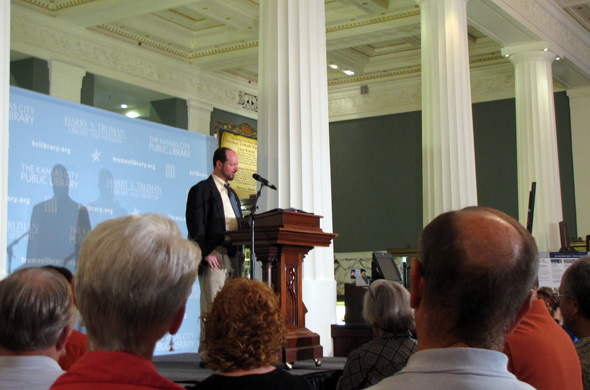Rosa Parks refused to give up her bus seat in 1955 and shoved civil rights forward.
In 1892, Homer Plessy sat in the white section of a train in Louisiana and launched decades of legally sanctioned Jim Crow laws.
Williamjames Hull Hoffer, a Seton Hall University history professor, spoke of the landmark Plessy case Tuesday at the Downtown Kansas City Public Library.
It was a daring attempt by a Creole group called Comite des Citovens to overturn a Louisiana law that forced blacks to sit in the “colored” car, he said.
Like many in the state and elsewhere, Plessy had little African American in him and appeared to be white, but Louisiana law was the “one-drop rule.”
Other states had different standards and it was often impossible to tell what race someone was. The law could have been challenged on those grounds, Hoffer said, but was not.
That may have been among many mistakes Hoffer’s lawyers made, he said, when they charged into the teeth of a racist supreme court.
The 7-1 decision turned aside any violation of the 14th amendment, which gives all equal protection under the law. The court ruled on public policy grounds that “separate but equal” provisions for the races were legal.
The majority opinion by Judge Henry Billings Brown is now regarded as a blight on the nation’s history while the lone minority opinion by John Marshall Harlan – himself once a slave owner – called for a “color-blind constitution.”
Hoffer is the author of “Plessy v. Ferguson:Race and Inequality in Jim Crow America.”
He said that a lawyer for Plessy, Albion Tourgee, probably had little chance anyway but handled the case poorly.
Tourgee was influenced by rhetoric of pre-civil war abolitionists more than legal logic, Hoffer said, and was best known for a fiction novel he wrote called, “A Fools Errand by one of the fools.”
“His mindset was extremely out of touch as well as being inappropriate,” Hoffer said.
After the 1896 Plessy ruling, even some states that had integrated passed Jim Crow laws. Such legislation in the south relating to voting for years legally disenfranchised African Americans with required proof of land ownership or literacy tests.
But the separate but equal ruling also planted its own demise. Through the decades it became obvious that the separate status, especially in education, was nothing resembling equal.
Details:
The Plessy majority opinion




Who’s talking